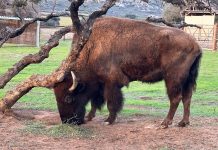
After living through the 2003 Cedar Fire, the 2007 Witch Creek Fire, and most recently this year, the Valley Fire, Summer and Brian Piper understand how frightening wildfires can be, both for humans and animals. Living in Jamul, Summer Piper, a retired San Diego County Sheriff dispatcher, and Brian Piper, a retired Border Patrol officer, embarked on a new journey in 2018, volunteering with the San Diego Humane Society’s Emergency Response Team, utilizing their skills in rescuing trapped animals from wildfires, dogfighting operations, and other threatening situations around the county and nationwide. Since February 2018, the couple has volunteered more than 1,534 hours combined.
Summer Piper said with the 2003 and 2007 fires, it was strange to work during these fires and be displaced at the same time.
“We just worked nonstop,” she said. “I don’t know if we really even comprehended the severity of it because we were so engulfed in working 16-18 hour days just for the fire itself so there was not enough time to occupy your mind and worry about what was happening at home.”
Summer Piper said the Valley Fire was the most intense because the flames were the closest to their home, and they feared that they lost their home.
“I called 911 when the Valley Fire started coming over the ridge of the mountain to the East,” she said. “And within an hour, the head of our team called and asked if we could deploy. All of our stuff was ready, we had already evacuated, so let’s roll.”
She said working that evening she looked in the direction of her house and the “red glow was so immense” she called her husband and said there was nothing left. But her teammates let her know that their house survived as they continued to work rescue the next morning.
Summer Piper said their beginnings with the SDHS’ ERT was “kind of a mistake.” Then it was called the Animal Rescue Reserve before being taken over by the SDHS. Brian Piper, getting ready to retire, was thinking of becoming a reserve humane officer, but that program was not running so they suggested the animal rescue reserve, and after meeting about the organization, with their love of animals and the experiences of the 2003 and 2007 fires, they were both hooked.
“We have had other fires like the Lilac fire, and you feel kind of helpless and want to do something,” she said. “This was great. It fits in because we are animal lovers, and we live in a community that is highly effected by things that this team does to help.”
They joined as part of the fire team, learned about the technical rescue team, another fit for them, she said. Then they joined the water team so they could be deployed to hurricanes and other water disasters.
“It all just fit with who we are,” she said. “And the community that we live in is also the community that we serve. It filled that handicap that we felt in 2003 and 2007 in what do you do?”
Summer Piper has traveled to other states for animal cruelty cases, and throughout the state of California. She went to the Lighting Complex fires to help the Monterey SPCA, whose shelter burnt and was evacuated, then recently the Caldor Fire, where its shelter was burnt. She has been deployed to Indiana for cockfighting cases and saved dogs from a puppy mill in Florida and helped rescue animals trapped in their homes or separated from their owners by wildfires across the state of California, including the River Fire in 2020, where she camped out overnight to keep the command vehicle secure.
Summer Piper said in their rescues, they have rescued, pigs, llamas, and recently helped evacuate the Children’s Nature Retreat in Alpine, helping relocate Watutsi, zebras, tortoises, and their other animals after they had been evacuated.
Summer Piper said the biggest thing that most people are unaware of in East County is that the SDHS ERT is available to help, but that is only part of the solution.
“The bigger part of the solution is the preparation that people can do beforehand,” she said. “My dogs have medication that they are on and special food. I always make sure that I have a bag packed just for them. So, the night that we evacuated from the Valley Fire I grabbed my laptop, my dog bag, and our personal prep box with important papers and things in it, and that was it. We were gone. It was really an easy process.”
She said obviously it is easier for her because she only has dogs and not huge livestock, but being prepared is huge, even just having a list of what your animals eat. Medications, or ailments they may have. She said in rescuing two horses, one had cancer, and the owner handed her a piece of paper, and they were able to leave immediately without having to gather information about the horses.
“If you have peace of mind when evacuating because you know things are taken care of, that gives your animals more peace of mind,” she said. “When you are stressed, your animals are stressed, so the calmer you are when we come and try to load them, they can see, they can smell fire, any stress on top of that makes it much harder on them.”
Summer Piper grew up with horses, but said she still has a lot of respect because they are very large animals and when scared, are unpredictable. She said that large animals that can see, smell, or sense danger, is still a learning curve for her in this work. She said it can be difficult with pasture animals that do not have that human contact, and if people do not train their animals to load can lead to problems. Most of the animals are prey, so they initially have that fight or flight response.
“You go in there with a healthy dose of respect, and a bit of fear,” she said. “Even though I was used to horses, working with them during a crisis like a fire is a whole different world. I do not know if you will ever be comfortable or confident in that type of situation because it is so unpredictable.”
Summer Piper said the emergency response team can help evacuate animals, assess property for fire dangers and make it able for sheltering in place, and if animals behind the fire line are sheltering in place, they will feed and water and care for them until the owners can get back to their properties.
She said another service they provide is for animals that cannot extricate themselves, such as an animal who is down, has an injury and cannot get up on their own, the team responds.
“We will respond with a rescue team, and we have a large trailer, lots of equipment. We can repel down, stand a horse or livestock up to help get them stable.”













